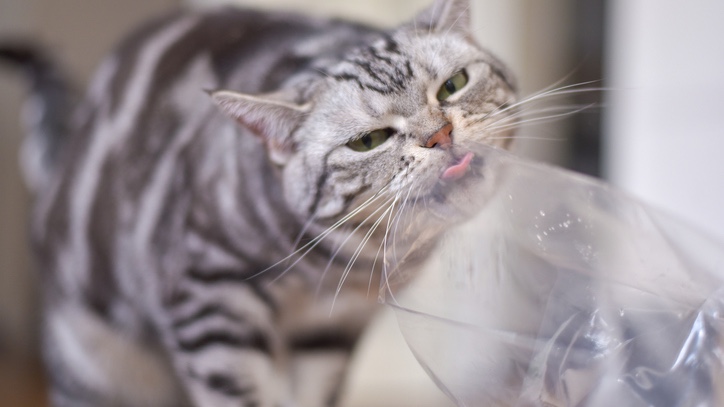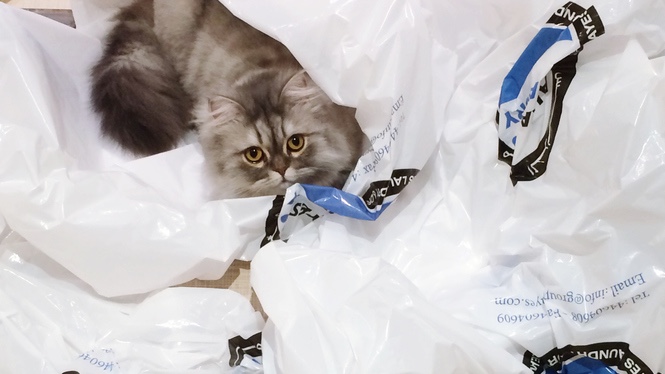Why does my cat eat plastic? And how do I get them to stop?
If you're wondering, “why does my cat eat plastic?”, you'll also need to discover ways of making them stop

Get the best advice, tips and top tech for your beloved Pets
You are now subscribed
Your newsletter sign-up was successful
With plenty of wonderful moggy meals on the market you may begin to wonder, “why does my cat eat plastic?” when there's just so many better options for your feline friend to tuck into.
Is it because your cat actually prefers it to the best cat food money can buy or does plastic actually have a delicious taste of its own? Is it even something of a rival to the best cat toys? Perhaps it's a little of all of these and more.
Before we get on with answering such burning questions, however, it's a good idea to define what we mean by plastic. In general, we're talking about grocery bags, plastic wrappers, straws, cables, cups, bottle caps and more.
These are items you wouldn't normally think animals would be attracted to, yet you may find your cat is licking and chewing them – seemingly with great pleasure.
Is it normal for cats to eat plastic?
It depends on how you're defining “normal”. If you're asking whether many other cats eat plastic, then the answer is yes – it's common to see a cat eating plastic. But is it desirable? Well, that's a whole different issue and, actually, not it is not. Cats who eat plastic live with a condition called “pica” and it's hazardous to their health.
Pica doesn't only affect cats. It's a general eating disorder that also affects humans and it refers to the eating of items which are not normally considered to be food. Given these items are unlikely to have any nutritional value, it's something to avoid. And, as you may have guessed, plastic definitely does not contribute to a healthy, balanced diet.
Why are cats attracted to plastic?
So naturally, you'd want to know why they are doing it? Surely animals instinctively know what is going to be good for them and that nibbling on plastic could potentially harm?
Get the best advice, tips and top tech for your beloved Pets
Well, there are a number of reasons why a cat would eat plastic and it could be because your pet feels as if they are nutritionally deficient. In reality, this isn't generally the case, though: if it was, then your cat would also be chewing on other things.
One key driver, however, is curiosity. We know how curious cats can be, constantly sniffing at items and looking around at the merest suggestion that something interesting is afoot.
In many cases, a cat is being attracted to plastic because they want to learn more about it. They may find themselves wanting to explore the crunchiness of a plastic wrapper or bag, for example, and get their heads around the noise.
In some cases, depending on the plastic, they may be attracted by the smell. Some plastic wrapping has come into contact with food, for instance, in which case, a cat will want to check to see if there are any remaining morsels attached to it. A cat may also simply be bored and in need of something to play with, finding joy in plastic, perhaps tapping into a predatory instinct, particularly if the item is moving.
But you may find that your cat is eating plastic because of an obsessive-compulsive disorder or because they are stressed. You may also discover that the behavior ties in with other signs of anxiety in cats. It's always worth asking, is your cat bored? as they may simply be looking for something to do.
In any case, you need to work on ways of preventing this behavior because it won't be good for them in the long run.

How do I get my cat to stop eating plastic?
Sometimes with great difficulty! We have known of cats who simply can't let go of their plastic fixation – in one case, the owner would throw a plastic wrapper in the bin, walk away and turn around as the cat tried frantically to get at it. But it's not impossible by any means. The trick is to keep a cat engaged. Indeed, cat enrichment is key.
Toys are always a good idea and you don't necessarily have to buy them. DIY cat toys can work just as well and often it's as simple as providing a customised box. But toys aren't the entire solution, you need a bank of cat enrichment ideas and a good number of them will involve you. Cats are social creatures and, while they may seem aloof, they're also keen to be around people.
So get on board with cat playground ideas and keep their minds on other things. It's also a great idea to hide all plastic from view and to dispose of wrappings and bags before your cat has a chance to spot them (this works wonders!). Eventually, you will find their obsession with plastic begins to wane.
What if my cat has eaten plastic?
If your cat has eaten and swallowed plastic, then you need to seek help from your vet. There are numerous signs to watch out for such as diarrhea, lethargy, cat constipation and vomiting. An intestinal blockages is the greatest risk.
In some cases, a cat is eating plastic because of an underlying health issue so don't be afraid to visit a vet if you're worried. In most cases, any potential problem can be resolved when caught early.

David Crookes has been a journalist for almost 30 years and he has written for a host of magazines, newspapers, websites and books including the World of Animals Annual, BBC Earth, Live Science, The Independent and Tom’s Guide.
Born in England, he lives with two cats but he’s also keenly interested in the differences between the huge number of dog breeds – in fact, you can read many of his breed guides that he’s written in collaboration with vets here on PetsRadar.
With a lifelong passion for technology, too, he’s always on the lookout for useful devices that will allow people to keep their pets happier and healthier, and provide them more time to spend together.
David has a degree from Durham University, as well as postgraduate diploma in journalism from the University of Central Lancashire.
